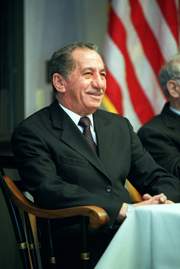 June
2, 2004 -- At an address at the Kennedy School, Tassos Papadopoulos, the
president of the Republic of Cyprus, defended his rejection of a United Nations
plan led by Secretary General Kofi Annan that would have united the divided
country. He said the rejection did not mean that Greek Cypriots were against
reunification.
June
2, 2004 -- At an address at the Kennedy School, Tassos Papadopoulos, the
president of the Republic of Cyprus, defended his rejection of a United Nations
plan led by Secretary General Kofi Annan that would have united the divided
country. He said the rejection did not mean that Greek Cypriots were against
reunification.
“I
want to stress that no one is more interested in a quick solution to the problem
than Greek Cypriots,” he said. “But this should be about reunification, not
creating two separate states in Cyprus. We will not accept that.”
The
tiny island in the Mediterranean Sea has been split since Turkey invaded the
country in 1974 and began occupying the northern part. Hundreds of thousands of
Greek Cypriots living in the area were driven from their homes. Today, the
country is divided into a northern section (controlled by Turkish Cypriots) and
a southern section (controlled by Greek Cypriots and the internationally
recognized government led by Papadopoulos.) The two sections are spliced by a
military occupied buffer zone.
In
April, despite international pressure, two-thirds of Greek Cypriots voted
“no” to the United Nations plan. A majority of Turkish Cypriots voted in
favor of the plan. Both sides would have had to agree in order for the plan to
go through. It was the first time since the 1974 invasion that citizens had a
chance to vote on a reunification plan.
“Our
position should not be mistaken or misunderstood. We do not ‘reject’ the
Annan Plan,” he said. “We still believe it is a good basis for an eventual
solution. We still accept a bizonal, bicommunal function federation, but this
version of the plan was not [that]. It is a huge and involved set of documents
which run thousands of pages and tens of thousands of words. It proposes a
system of governance which has not been tried in any other country — a
Swiss-inspired head, with a Belgian-inspired body grafted onto our little
island, which is neither Switzerland nor Belgium.”
Papadopoulos
said he was concerned that under the United Nations plan, many displaced Greek
Cypriots still would not be able to return to their northern homes. He also
worried about “the ability of the Cypriot government to ensure for its
citizens the ability to live in an efficient and prosperous state which respects
democracy and the rule of law.”
Outsiders
disappointed in the “no” vote, however well meaning, must respect the
people’s vote, the Cypriot leader said.
“It
is very telling that about 70 percent of the refugees that had hopes of
returning to their homes and properties or getting compensation in lieu, voted
against the plan,” he said. “They cannot all be naïve. They cannot all
be deceived. The people of Cyprus are a highly literate society and have a proud
tradition of democratic process and freedom of expression. The decision of the
people must be respected by all.”
The
president also said the issue was about the right of a people to judge the best
solution for themselves. “The issue concerns mainly us and the generations to
follow us,” he said. “We expect the international community to understand
that our disappointment with the provisions of the Annan Plan is greater. After
all, it is our country which is under occupation.”
The
address was co-sponsored by the Kennedy School’s Center for Public Leadership;
Kokkalis
Program on Southeastern and East Central Europe; Program
on Intrastate Conflict, Conflict Prevention, and Conflict Resolution; the Center
for International Development; and Harvard
School of Public Health.
Photo:
Harvard News Office/Rose Lincoln
[Homepage]
[Top  ]
]
 June
2, 2004 -- At an address at the Kennedy School, Tassos Papadopoulos, the
president of the Republic of Cyprus, defended his rejection of a United Nations
plan led by Secretary General Kofi Annan that would have united the divided
country. He said the rejection did not mean that Greek Cypriots were against
reunification.
June
2, 2004 -- At an address at the Kennedy School, Tassos Papadopoulos, the
president of the Republic of Cyprus, defended his rejection of a United Nations
plan led by Secretary General Kofi Annan that would have united the divided
country. He said the rejection did not mean that Greek Cypriots were against
reunification.